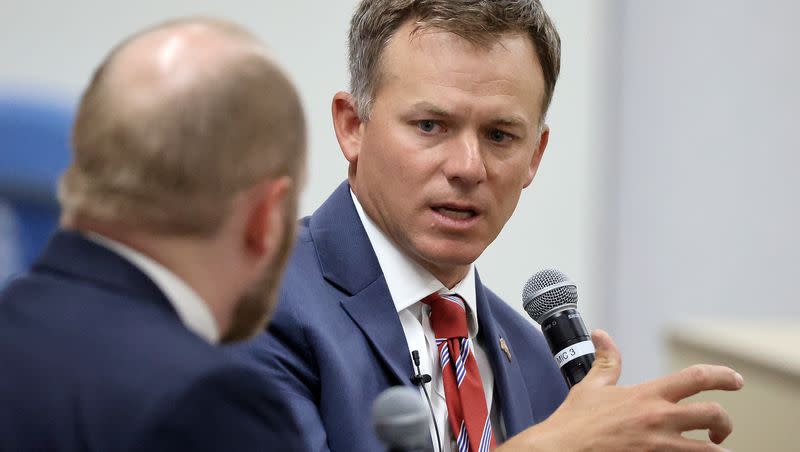Rep. Moore: Republican ‘quibbling’ stalls spending bills ahead of January deadline

- Oops!Something went wrong.Please try again later.
- Oops!Something went wrong.Please try again later.
Republican “quibbling” has prevented House lawmakers from advancing conservative spending bills to the Senate, Rep. Blake Moore said Wednesday, putting Congress on a path toward a third funding deadline scramble in January after near-misses in September and November.
Moore is confident his conference will pass the remaining funding packages before the current extensions expire on Jan. 19 and Feb. 2, but he shares the frustration of his colleagues and constituents at his party’s inability to work together on shared objectives.
“We’re quibbling over these bills and making them exactly what every single Republican in the House wants, when we just need to finalize them and send them over to the Senate,” Moore told the Deseret News on Wednesday.
Why can’t Republicans agree on spending?
The House has succeeded in passing seven of the 12 annual spending bills, including funding for defense and several government agencies, while the Senate has only passed three which were bundled into a single bill. Once each chamber has passed all 12 bills, committees will meet, or “conference,” to reconcile the legislation and hopefully produce a final version that can gain a majority in the House and Senate.
However, the last few weeks have seen little to no progress on bringing spending bills to the floor for a vote as Republicans have failed to agree on top line spending numbers as well as individual provisions despite the legislation’s significant spending cuts.
Such intra-party gridlock is what forced former House Speaker Kevin McCarthy, R-Calif., to pass a bipartisan “clean” continuing resolution to continue funding the government at current levels until mid-November. This was the last straw for party hardliners who then caused McCarthy’s historic removal.
The pattern was repeated last month with McCarthy’s replacement, Speaker Mike Johnson, R-La., who suffered several failed attempts at passing the remaining spending bills before resorting to a novel “two-step” continuing resolution which passed with Democratic support but brought Congress no closer to funding government operations for next year and put him in a precarious position with the conservative House Freedom Caucus.
Related
House moves to avoid shutdown, putting Speaker Johnson in precarious position
Utah congressmen express anger after Speaker McCarthy ousted
Does Rep. Blake Moore want a shutdown?
Moore, who serves on the committees overseeing taxes and the budget, is a firm supporter of the stated goal of the Freedom Caucus’ fiscal hawks to return the annual appropriations process to the statutory ideal of single-subject spending bills that are open to amendments.
But the two-term congressman said he questioned the effectiveness of making the perfect the enemy of the good by insisting on hyperpartisan demands which almost inevitably lead to 11th hour compromises with the Democratic Senate that undermine conservative priorities.
“My voice has always been to get (spending bills) as best as we possibly can, send them to the Senate, once we conference them, stand firm on the things that we need to make sure to see and go from there,” Moore said.
The Utah representative recently scored the position of House GOP vice chair. In doing so, Moore joined the ranks of party leadership and gained a platform to influence party members to work together, he said, instead of kicking the can down the road with temporary funding measures.
“I can help share with leadership, and the conference in general, just the negative effects of not finalizing our appropriations process,” Moore said.
Related
Rep. Blake Moore hopes new leadership role will help GOP ‘go out and win the future’
Utah Rep. Blake Moore — a ‘rising star’ — wins Republican conference leadership position
How do spending talks in Congress affect defense spending for Utah?
A particular point of emphasis for Moore, whose 1st Congressional District contains Hill Air Force Base, is the importance of officially passing defense spending for next year.
“Doing a potential long-term (continuing resolution) is really detrimental to our defense,” Moore said. “We’ve got real problems out there in the world, that need new solutions that we’ve been thinking through and creating policy towards. But if we just get into a long-term (continuing resolution) because people are too scared to vote for an appropriations bill then we’re going to make a far worse investment in our defense.”
Moore said he is familiar with the plan to get the remaining spending bills out the door “and have something that’s workable” through his work behind the scenes supporting House Republican Conference Chair Elise Stefanik, R-N.Y.
“We definitely know the timelines and we’re working toward getting it done,” Moore said.
However, House members are scheduled to leave D.C. for their Christmas recess next week on Dec. 14, and when they reunite on Jan. 9 Johnson’s razor-thin majority will be reduced to just two votes, following the expulsion of Rep. George Santos, R-N.Y., last week and Wednesday’s announcement that McCarthy will resign.

